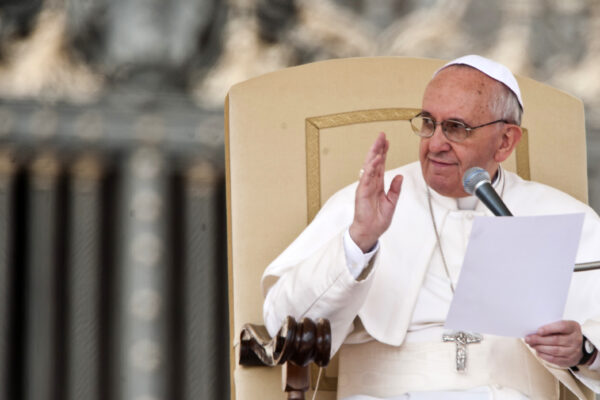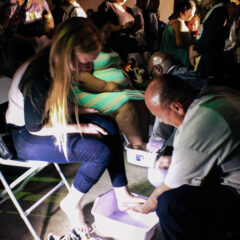This post originally appeared in the Los Angeles Times.
When my parents went to schedule my older brother’s baptism at a Catholic church, the priest told them their baby was a bastard. Because my parents were married in the Episcopal Church, their child was, in the eyes of the Catholic Church, illegitimate.
The bastard comment became a family joke, and my father eventually brought his Episcopalian-baptized kids back to the Catholic Church. Yet, it’s hard for me to ignore the fact that the Catholic Church still doesn’t see my parents’ relationship as valid even after 38 years of marriage. To be an American Catholic today is to live with a tension between church teachings and the beliefs born of one’s daily reality.
With Amoris Laetitia (“The Joy of Love”), the apostolic exhortation on marriage and family life published Friday, Pope Francis asks modern Catholics to stay in this tension — and for the church to make room for them. Moral laws are not “stones to throw at people’s lives,” he writes, opening the door for pastors to find a way for those in “irregular situations” like remarriage to participate fully in their faith.
Passages read more like a contemporary marriage manual than an apostolic exhortation. He reflects on Paul’s definition (“Love is kind…”) and reminds couples to schedule dates to be alone together. “We find it difficult to present marriage more as a dynamic path to personal development and fulfillment than as a lifelong burden,” Francis writes.
But the pope also insists on traditional gender roles and admonishes against sex, birth control and same-sex marriage.
That approach may not be enough to stem the decline in the church membership.
Today the lack of welcome in the church is often subtler than calling a baby a bastard. Couples planning weddings, for instance, complain that parishes care only about money and paperwork. They lie about cohabiting to avoid being lectured. If Francis could make pastors more welcoming, it would be a significant change. Yet fewer couples want church weddings in the first place: The number of weddings in Catholic churches is today less than 40% of what it was in 1970.
According to the Pew Research Center, one-quarter of U.S. Catholics have gone through divorce, and 44% have lived with a romantic partner without being married. Fewer than half of American Catholics agree with the church that homosexual behavior, remarriage without an annulment, cohabitation and contraception are sins.
Not coincidentally, since 2007, the Catholic share of the U.S. population has declined from 24% to 21%. The Pew Research Center reports that 9% of Americans are former Catholics, and another 9% are “cultural Catholics.” The church is growing in Africa and Asia, but in Latin America, many Catholics have moved to evangelical and Pentecostal churches, which preach forgiveness without all the legalisms.
In contrast to his evidence-based and science-driven encyclical on the environment, Amoris Laetitia ignores empirical research on gender and sexuality. A growing body of evidence, for instance, suggests that transgender identity is biological, but Francis dismisses it as “ideology.” “Human identity becomes the choice of the individual, one which can also change over time,” he writes.
This creates a disconnect. As Father Joseph Palacios, a sociologist and fellow with the USC Center for Religion and Civic Culture explains, “If the Catholic Church says we have a faith based on reason, the reason isn’t there anymore for 90% of the population.”
A drastic change in doctrine couldn’t have been expected. Francis leads a global church, and by empowering local clergy to discern individual situations, he avoids fracturing it over rules. But for Catholics on the edge of the church already, the progress made by “The Joy of Love” may be too little. It will, I predict, go the way of “Theology of the Body,” St. John Paul II’s teachings on marriage and sex that also extolled nurturing mothers, masculine fathers and sex that is “open to life” (read: without contraception). It is loved by a small group, actively rejected by others and irrelevant to the lives of the vast majority.
A case-by-case pastoral approach won’t cement the tenuous relationship so many families, mine included, have with the church.
My dad remains a loyal Catholic, even serving as a Eucharistic minister. Mom stopped going to Mass regularly. Had Francis’ welcoming words come earlier, she told me, perhaps her relationship with Catholicism would have been different. Once a bastard baby, I am now my nephew’s godmother. At his baptism, I promised to help teach him the faith, yet I remain conflicted about it myself.
Photo Credit: Mazur/catholicnews.org.uk via Flickr
Megan Sweas is the editor and director of communications with the USC Center for Religion and Civic Culture.






